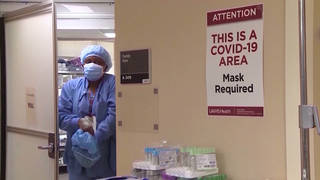
By Amy Goodman & Denis Moynihan
We are done with COVID, but COVID is not done with us. The subvariant of Omicron, dubbed BA.2, is causing spikes in infections, hospitalizations, deaths and lockdowns in different parts of the world. In the United States, the statistics have been promising, but cases have been rising enough to prompt the CDC on Wednesday to extend the national mask mandate for travel hubs and public transit, including planes, for an additional two weeks, until May 3rd, and also extended the national public health emergency determination for an additional 90 days. While BA.2 creates uncertainty in the course of the pandemic, one fact has become increasingly clear: COVID-19 has exposed significant disparities in how health care is delivered and accessed in our society. In the initial months of the pandemic in early 2020, Black Americans were three times more likely than whites to contract COVID-19 and to require hospitalization, and twice as likely to die of the disease.
“The pandemic exacerbated preexisting social and economic disparities that have long festered in the US, including a deeply divided society, widespread poverty, a weak social safety net, inadequate living conditions, and a lack of trust in science that predated COVID-19,” the Poor People’s Campaign summarized in its recent “Poor People’s Pandemic Report.”
These dysfunctions and inequity won’t be overcome until everyone, regardless of who they are or where they’re from, are guaranteed healthcare as a fundamental right.
One of the most compelling speakers on the subject of universal healthcare is no longer able to physically speak at all. Activist Ady Barkan was diagnosed with terminal ALS in 2016, and uses a system that translates his eye movements into spoken words.
“It’s shameful that in the richest country in the world, we choose to inflict so much suffering,” Barkan said, testifying remotely before a recent House committee hearing on Medicare-for-All. “The pandemic has revealed and exacerbated the existing inequalities in our profit-driven healthcare system. It has hit hardest on disabled people, poor people, Black, Latino and Indigenous people, and especially people who live at the intersections of these categories. And one out of three COVID-19 deaths in the U.S. are related to gaps in health insurance. Nearly a million Americans have already died from the coronavirus. How much more is necessary to shock our legislators into action?”
Medicare-for-All is a proposed reform of the U.S. healthcare system that would take the popular Medicare health insurance program, currently available to citizens and permanent residents 65 years of age and older, and extend eligibility to all. Medicare is a form of single-payer healthcare, in which the government itself does not provide medical services, but makes the payments on behalf of those who it covers. Thus, hospitals, doctors’ offices, pharmacies and the like all remain as they are. The for-profit health insurance companies, however, are removed from the equation, saving over $500 billion dollars per year, as estimated in a report by Public Citizen.
Medicare-for-All also guarantees that no one would be left uninsured. The Kaiser Family Foundation estimates the current number of uninsured people in the U.S. at around 30 million.
“When this pandemic started, there was an awareness that our healthcare system was not going to perform well with 30 million uninsured, with far more underinsured,” Dr. Adam Gaffney of Harvard Medical School said on the Democracy Now! news hour. He co-authored a study that showed uninsured people are more likely to contract COVID-19. “We need to be expanding our public health infrastructure to tackle not only the pandemic of the present but the pandemics of the future, to say nothing of the other health threats that face us in the years to come, like the impact of climate change and much more.”
The pandemic has hit Black Americans particularly hard. In a new report, “The State of Black America and COVID-19” by the Black Coalition Against COVID (BCAC), the Yale School of Medicine, the Morehouse School of Medicine and others, Yale’s Dr. Marcella Nuñez-Smith writes, “In January of 2022, rates of COVID-19 hospitalization for Black Americans were the highest they have been since the pandemic’s start.”
Dr. Oni Blackstock, an African American primary care and HIV physician and founder of Health Justice, said on Democracy Now!, “The reality is that we are all interconnected and that if the Black community has access to care, to safety measures, that actually is something that can protect all of us.”











Media Options